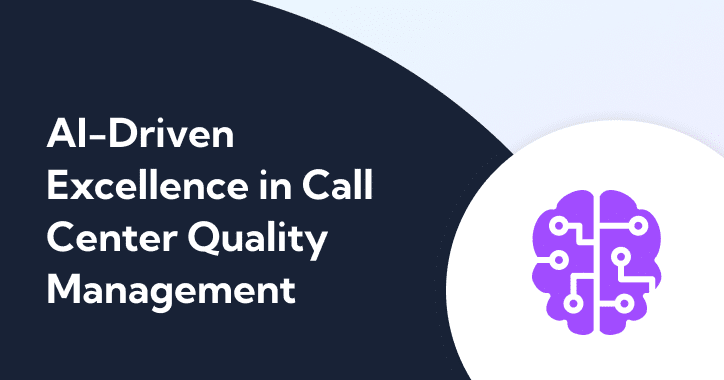
Guest Post: Chris Kontes
Let’s start by addressing the elephant in the call center: coaching, while massively important, isn’t that fun for call center managers and agents alike. Many call center managers avoid coaching, reporting that coaching one new skill takes at least 10 hours; even so, most managers believe coaching is the most important thing they could be doing.
But what exactly are the challenges that make call center coaching such a tough task to tackle, and is there any way to remedy them?
Let’s explore the hurdles that stand in the way of effective coaching, and show how the right approach can help you get past them.
What is Call Center Coaching and Why is It Important?
Call center coaching is educating customer service agents on their job duties and how to perform them effectively. It’s vital for maintaining service quality, meeting KPI goals, and enhancing employee productivity and satisfaction.
Coaching is more comprehensive than performance reviews. While performance reviews aim to evaluate an agent’s performance over a specific time frame, coaching sessions are meant to improve performance. Both are essential for maximizing agent performance, as Quality Management (QM) assessments can be used to design tailored coaching sessions based on their performance. In other words, coaching and QM complement each other.
Typically, coaching starts with problem identification. A call center manager may notice that an agent is lacking in a particular area, like technical knowledge, for instance. A key aspect of coaching is to ensure that the agent fully understands what they’re doing wrong, why they need to work on it, and how this will help them perform their job more effectively and improve customer satisfaction.
It’s also important to incorporate hands-on practice sessions with real-life examples and mock calls, as coaching sessions that heavily rely on theory aren’t often effective in contact center environments.

Why You Need Call Center Coaching, Even if it Isn’t Fun
Contact center coaching isn’t always “fun”, though you can make it less boring by designing interactive educational activities for your agents. Still, it’s important to incorporate some form of coaching into your contact center’s agenda.
And we’re not just talking about onboarding here. Many contact center managers assume that training ends after the onboarding process, but without ongoing coaching, your agents will feel less engaged.
Not to mention, they’ll have a hard time figuring out how to improve their performance or overcome their weak points, which can also negatively impact your service quality and customer satisfaction scores.
Coaching Builds Trust and Maximizes Employee Engagement
Coaching builds mutual trust between call center managers and agents. Training your agents is a great way to show them that you’re actually invested in their personal and professional development, which motivates them to excel at their jobs and increases engagement.
At the same time, knowing that your agents are well-trained for the job makes you confident in their ability to do their job effectively. You may also consider collecting feedback on your coaching program to demonstrate your openness to negative feedback and commitment to maximizing the program’s value.
Coaching Improves Contact Center KPIs
Investing in well-designed coaching programs can directly have a positive impact on your contact center performance and relevant KPI targets.
By providing agents with the knowledge, practice, and resources they need to go above and beyond in their jobs, you’ll be able to meet your KPI targets, such as FCR (First Contact Resolution, CSAT (Customer Satisfaction Score), and AHT (Average Handling Time).
To maximize the benefits of your coaching efforts, consider creating personalized training programs for each individual. By focusing on your agents’ unique strengths and weaknesses, you can help them improve their skills faster and overcome the problems they struggle with the most.
Effective Call Center Coaching Helps Agents Hit Their Targets
You can’t expect your agents to hit their targets if you don’t show them how to do it. By continuously training your agents and communicating issues as they arise, you’ll empower them to reach their goals faster.
Tools like call recording and speech analytics software help you identify the reasons behind low scores and evaluate contact center agent performance effectively. They also allow you to create customized training programs for each agent.
The Challenges of Good Call Center Coaching
We’ve all dealt with call center coaching challenges, and even though you might feel alone in your struggles, the truth is most of these issues are pretty common. Do any of these call center coaching techniques ring a…phone?
- Good coaching preparation takes A LOT of time. Smart call center coaching methods takes serious preparation. After all, nothing is more awkward than a bad coaching session between managers and agents. Being stuck in a conference room with disengaged agents isn’t anyone’s idea of a good time, so preparation and planning are key. But even armed with contact center training program outlines, managers have to put in work before a session. In fact, most managers spend 5x as much time prepping as they do coaching.
- Coaching wreaks havoc on contact center bandwidth. During coaching sessions, call center reps and agents need to stop customer interactions and speaking with prospective customers, which is their job. With so many call centers already at capacity, that’s a no-go.
- Coaching doesn’t scale. Let’s say a call center manager with 100 agents has an excellent 30-minute coaching session with an individual agent. Naturally, the call center manager might want to provide that training for the rest of the agents. But that could take literally 50 hours — that’s more than two full days, and well over a full work week. So even if you were to crack the call center coaching code, it’s still almost impossible to deploy at scale.
These are a few of the most common challenges with call center coaching, but there are plenty more.

Call Center Coaching Best Practices
Here are some tips that can help you make the most out of your training sessions:
Prepare for Coaching Sessions
Preparing for your coaching sessions beforehand is important to maximize their benefits. Your agents probably don’t want to waste their time attending coaching sessions that barely bring anything new to the table.
In fact, preparing for your coaching sessions should constitute around 70% of the time you dedicate to them, while only 30% is dedicated to actual teaching.
Before you inform your agents about the upcoming training session, make sure that you set measurable and achievable goals for the session to put you on track. It’s also important to develop a detailed structure for the session and incorporate a mix of theory and practice, as well as activities that encourage collaboration, such as team workshops.
Consider each agent’s performance over the most recent period and tailor your training materials accordingly. Use data and insights collected from sentiment and conversational analytics platforms to identify patterns and trends and place more emphasis on areas that require urgent work.
Bring Examples from Call Recordings
Teaching by example is probably the best way to communicate your point with as little effort as possible.
You could spend countless hours talking about the issues in service quality and end up finding that little has changed. The other, more practical route is to demonstrate relevant examples to your team from real recordings of customer conversations.
This approach enables you to highlight the issues in a clearer way and improve the agent’s performance. You can then test your agents by playing other recordings and asking them to point out what went wrong or could’ve been handled more effectively.
Further, you can make your agents learn how to handle customers in complex situations by allowing them to listen to conversations conducted by top performers at your company.
Develop an Action Plan
An action plan provides a clear direction for your coaching program and its desired performance improvement outcomes.
As your training course approaches its end, you need to discuss improvement opportunities with each agent and create an action plan that sets a clear path for turning these opportunities into achievable and time-defined objectives.
Ideally, your action plan should incorporate SMART goals that are:
- Specific: Highly targeted goals with clear outcomes.
- Measurable: Can be expressed and tracked in numbers.
- Achievable: Can be realistically achieved with the available resources and agent qualifications.
- Relevant: Goals that directly contribute to better outcomes for your agents and contact center overall.
- Time-Bound: Defined by a specific start and end date.
Base Your Coaching on Different Call Types
One mistake call center managers make when identifying performance trends is to only consider an agent’s “general” performance score. This approach isn’t often effective as your agent may only be struggling with a specific call type.
For example, one agent could be great at handling customer queries related to technical issues but struggle to provide support when there’s a payment or refund problem.
By pinpointing the areas your agents need support in, you can provide more targeted coaching plans that yield better results.
Provide tailored Feedback
Effective feedback is foundational for your coaching approach. Ideally, you should provide agents with feedback that:
- Targets a very specific and tangible issue
- Is provided in real-time time or shortly after calls for context
- Is based on both qualitative and quantitive data collected from actual calls the agent handled
It’s also vital to talk to your agent about how they can overcome the problems they face and enhance their performance. Create a time-bound action plan that helps you and your agent track progress and provide regular feedback throughout the process.
Keep Your Agents Motivated
During coaching sessions, you should aim to motivate and inspire agents to reach their true potential rather than diminish their confidence.
Start by asking some open-ended questions that lead to fruitful discussions, balancing your focus between the positives and the negatives. Avoid criticizing them as individuals and emphasize particular behaviors or shortcomings instead.
Also, while listening in on live calls is vital to evaluate agent performance and guide your coaching sessions, it shouldn’t be an overwhelming experience for your agents. You can utilize software that enables you to shadow the calls without your agent knowing to avoid making them anxious.
Moreover, it’s equally important to observe your agents at their desks. Sometimes, the reasons behind declining performance can’t be captured on calls. Certain work habits at the desk may lead to poor time management or hindered productivity, causing a decline in performance.
Continuously Track Progress
A coaching session is only a single step of the coaching process. Once you’ve made sure that your agent understands the problem and has practiced working on it, you need to follow up with them to make sure they’re on the right track.
Conversation intelligence solutions can make this easier with automated alerts and sentiment analysis that inform you when agents deviate from script or are struggling to help customers, enabling you to follow up with your agents more efficiently and ensure a higher ROI from of your coaching efforts.
An Example Coaching Strategy for Success
There are a few call center training principles to keep in mind: keep your coaching short, focused, and fun.
1. Keep Your Call Center Coaching Short
Don’t hesitate to keep the call center coaching session under 10 minutes and hyper-focused on a single coaching objective – it will save you time, be a lot more fun, and call center agents are much more likely to remember and apply what they’ve learned.
2. Keep Coaching Focused
It’s easy to try and cover too much in a coaching session. After all, there are always a million things we could be doing better, from talk speed to active listening, objection handling (sales), or average handle times (customer service).
For example, let’s say you’d like to coach an agent on opening statements. Let’s break introductory statements down further, like this:
- High-Level Call Center Coaching Goal: “I want to coach my agents on Introductory Statements.”
- Drill Down 1: “Specifically, I want the tone of their conversation to be better.”
- Drill Down 2: “And their opening statements have a few parts. Let’s focus on the first sentence of the opening statement.” Rather than coaching “opening statements,” you’re now coaching on “tone” in the first sentence of a conversation. Plus, it sets up the foundation for further call center coaching sessions, since you can easily map out micro-coaching sessions that build on each other.
3. Keep Your Coaching Fun
Short and focused lend themselves well to the fun. In a warm and fun tone, ask the agent to practice the first sentence of the conversation 10 times over (one practice run for each minute of the session). Make it fun and informal; agents might think it’s silly, but it keeps them energized and, more importantly, excited about future call center coaching sessions.
Common Call Center Coaching Tools
There are many ways to approach coaching in your call center. These include:
One-on-One Coaching
One-on-one coaching is invaluable for your agents’ growth.
Since one-on-one training meetings are so personal, they can make agents feel more appreciated and engaged. They also provide an opportunity for the agent and trainer to get to know each other and discuss job-related challenges more openly.
In larger call center facilities, it may be hard to fully rely on one-on-one coaching. Still, you can integrate it as a part of your overall coaching strategy.
Shadowing is also considered a type of one-on-one coaching. But instead of it being a formal training session that involves a trainer and an agent, the trainee just spends the work day with another more experienced peer to benefit from their expertise. The main advantage of this approach is that it’s easier to implement and requires fewer resources.
Call Center Simulation Training
Utilizing call center simulation and role-playing enables your agents to practice what they’ve learned in your coaching sessions.
In a typical role-playing session, the agent talks with another fellow agent who acts as the customer in a mock call. The agent that assumes the customer role may be given a script to follow, while the other agent is given guidelines on how they can handle the situation.
Further, it’s crucial to provide the agent with positive feedback and constructive criticism of their performance after every mock call. The end goal is to help the agent handle different situations more effectively.
Mock calls help minimize risk and enable agents to practice their skills and gain confidence before interacting with real customers. They can also be very useful when introducing new products or policies.
Another great way to utilize simulation calls is to design them based on customer feedback. For instance, if a particular customer says that agents are unable to handle payment issues properly, you can focus your mock calls with your agents on this particular area.
Real-Time Guidance
Providing your agents with real-time guidance and coaching during live calls can help them navigate complex situations and learn how to understand the customer’s intent and resolve their queries accordingly.
There are two types of real-time guidance that you can combine for coaching call center agents:
- Manager coaching: Call center managers can listen to the agent’s conversation with the customer and intervene when the agent asks for assistance.
- AI-enabled guidance: AI-enabled conversation analytics solutions assist agents in real-time during calls by conducting speech and sentiment analytics and providing the agents with multiple response choices to help them tackle tricky situations.
Try Balto for Call Center Coaching
Balto empowers your agents with AI-enabled guidance and assistance during live calls in real-time, enabling them to handle complex situations more effectively.
Access insightful analytics about your agents’ performance and identify the root causes of poor scores. Gain a deeper understanding of each agent’s strengths and weaknesses to spot potential areas of improvement and tailor your coaching programs accordingly.
Get a free demo to learn more about how Balto can boost your coaching initiatives. Start unleashing the real potential of your agents!






